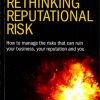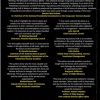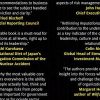The world is starting to show signs of instability. Whether it be the widening gap between rich and poor, the rapidly changing climate, or the unpredictability of what is in store for us, people are using the rapidly spreading internet to voice their fears and concerns. Another disconcerting trend is the malicious influence of deliberate misinformation, the rise of post-truth.
In the face of such looming crises, I am sure people are looking for guidance, a roadmap indicating what steps to take.
Indeed, the ability to respond to crises is the hallmark of any well-organized company or organization. For if the organization is unable to deal with an unexpected situation satisfactorily, it risks exposure to reputation risk that endangers not only the trustworthiness of the institution but also its very existence.
There is now a book, ‘Rethinking Reputation Risk: How to manage the risks that can ruin your business, your reputation and you’ that explores this very real threat. It also has cited a mention to the NAIIC on Fukushima Nuclear Disaster, so I was asked to review the galley of this book for comments.
The photo above shows the book cover. The back features blurbs from relevant experts endorsing this book. I too was asked, and I gladly obliged with 4 different rough ideas, but I was a bit disappointed to see that they were not edited further by professional editors to make them better.
”This thoroughly enjoyable book is a must-read for leaders of all organizations at all levels, right up to the board and its leadership.”
Dr Kiyoshi Kurokawa
Chairman of the National Diet of Japan’s Independent Investigation Commission
Another book I have featured here is ‘Whiplash: How to Survive Our Faster Future’ by Joi Ito of MIT Media Lab; I received a complimentary copy over the holidays. The book covers topics have been discussed with Joi for the past few years, and it seems to be turning into a great societal concern.
Yes, the only thing that is constant in this world is change.



